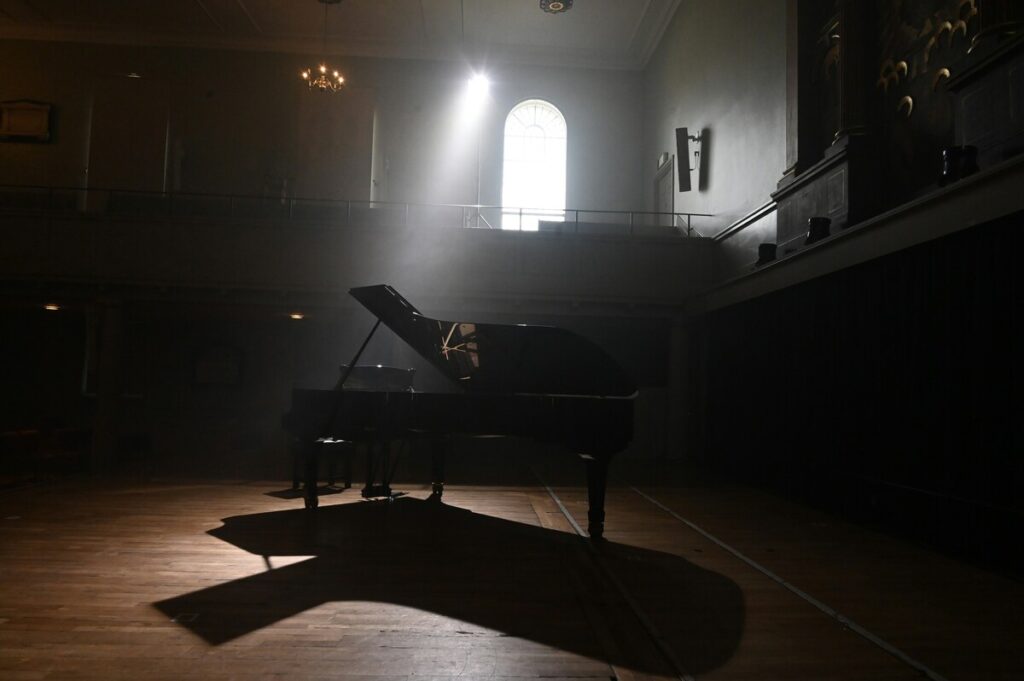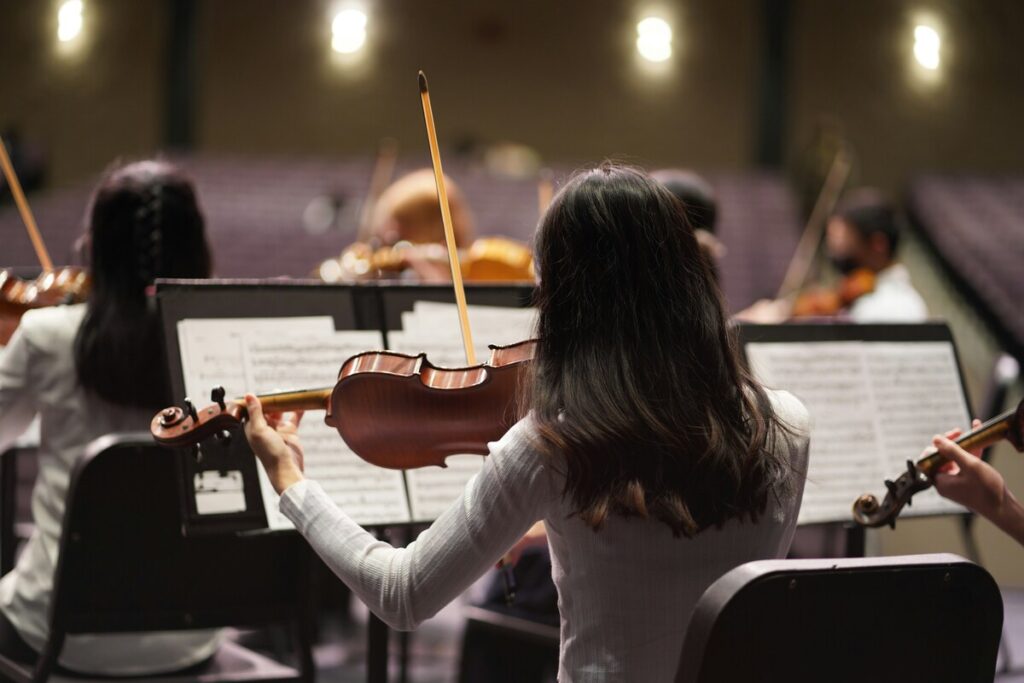Performance anxiety is the bane of many young musicians. Often, it’s not lack of skill or know-how that keeps a person off stage.
It’s fear.
I know what it’s like to have the enjoyment of an art form stolen by stage fright. Worse is when it stays stolen and the loss drives you away from something you once enjoyed. You look at your peers and wonder why they never seem nervous and pretty soon you’ve shamed yourself into thinking you’re less-than.
If that’s where your thinking ends, you’ll never break the cycle of performance anxiety.
In my last post, Tame Your Nerves: How to Overcome Performance Anxiety, I laid out a generalized, seven-step approach to conquering stage fright, applicable to all performance areas (speech, music, sports, academics, etc.). But I wanted to get a little more specific in this post.
Ever wonder what skilled performers think about on stage or what they do in the practice room that’s different from what you’re doing? Are they truly unafraid or just better at hiding it? I was curious too, so I called upon a few old friends from my college days, musicians who have gone on to successful careers in performing and teaching. What I learned both fascinated me and confirmed what I already suspected: performance anxiety is not a unique struggle.

Hey, I’m Lauren, author of YA Christian fiction and
blogger for teens ready to level up in faith.
Subscribe for inspiring content and free YA ebooks!
In This Article
The Survey
Each of the surveyed musicians answered a series of questions focused on two areas: live performance and practice time. Note that while the information gleaned is specific to musicians, much of it can be translated to break the cycle of performance anxiety in other areas.
Focus Under Pressure: Stay in the Moment
Question #1: When performing live, where is your mental focus?
- “It’s usually a combination of staying connected to my body on a macro level, especially breathing and feeling grounded, along with trying to stay in the moment with the music.”
- “While I’m performing, I’m mostly thinking about enjoying being in the moment and just really being in tune with the feeling of the music itself.”
Think about a time when you were alone and ended up playing a piece the best you’d ever played. How did it feel? What was happening inside your head? What was the music doing? If you’ve had this experience, you know how magical it is—like entering a fantasy novel.
Then you walked on stage and reality slapped you sideways. What happened?

For many young musicians, the wide disparity between how it feels to practice alone versus performing live can be attributed to your mental “train” switching tracks. There’s something about an audience that makes you disconnect from the music and latch onto the eyes and ears around you. Yet, overwhelmingly, those surveyed agreed that being in tune with your body, the music, and the moment was key to a successful performance. So how do you make that happen?
It takes practice, and many years of it. But there are things you can do now to pave the way for a deeper onstage focus.
Practice This!
- Remember why you’re doing this. What is it you love about your instrument and your music? Focus on that.
- Don’t let lack of practice and preparation be the reason for your fear. It’s one thing to be nervous because you’ve never performed at a certain venue before, quite another to be terrified because you hardly practiced.
- Decide how much control to give your audience. The audience doesn’t have power over you or your playing—unless you give that power to them.
- If you struggle with performance anxiety, talk about it! Talking to your teacher, your peers, and other musicians helps because a) you’ll realize you’re not alone, and b) you’ll glean new coping skills.
Audience Awareness: Tune In or Out?
Question #2: How much are you aware of the audience during a performance?
- “Occasionally. I’m aware of the audience as a component that is needed for the performance to occur.”
- “I’m fairly consistently aware of the audience at all times, but it’s never my main focus.”
- “I am aware of them very much, as I walk on stage. When I sit down at the piano, I change focus to the instrument and rarely think of them again.”
You don’t have to have the alien ability to completely ignore your audience to enjoy performing. Nor did anyone in my survey mention the old trick of imagining them in their underwear. (Personally, I never understood that tactic.) In fact, it was quite the opposite.
Successful performers have an amicable relationship with their audience in that a performance can’t happen without someone to watch it. You both bring something to the table: you, your talent and unique interpretation of the music, and your audience, their pleasure and encouragement. It’s a classic give-and-take alliance.
Practice This!
- Cultivate an attitude of gratitude toward your audience. They’re allowing you the opportunity to share your art and your hard work. They’re there because they appreciate music too.
- Remember: You’re bringing a gift to the stage. It’s like laying out a feast for the senses and inviting them to come to your table and enjoy it.
From Nerves to Nirvana: Handling Performance Anxiety When It Strikes
Question #3: How do you handle performance anxiety on the spot?
- “I come back to my breathing and slow it down. We do have control over our physical body, even when[ performance anxiety] might be trying to convince us that we don’t!”
- “I might flub it a bit, but fake it and keep going. I remind myself that everything is momentary and imagine pressing a ‘reset’ button mentally.”
- “The best way to break an undesired habit [is] not to fight it but to distract yourself from it.”
Ready for a shock? Even pros make mistakes in live performances. And even pros experience performance anxiety. Most, however, noted that moments of stage fright were usually tied to a specific reason, like encountering a particularly thorny passage of music or performing in front of people whose opinions really matter. The key to dealing with it is not to panic over panicking but to move through the sensations.
You have more control than you think.
Practice This!
- When you encounter performance anxiety on stage, let it run its course. Trying to make your anxiety go away only adds to your panic. Acknowledge it and work with it.
- Take a few slow breaths. There’s a reason you see this in fiction during panicked or angry scenes. Controlled breathing has a wide, calming effect on the body.
- Replace negative thoughts with positive thoughts. When your mental train starts spiraling toward self-criticism or doom, steer it toward positive thoughts—which tend to be more accurate anyway. Do this in practice and it becomes more natural onstage.
- Consider your audience. The people who make us most nervous—family and friends—are also the same people who will support you if you bomb it!
Again, these techniques take time to perfect. Experience and practice are on your side.
Breathe, Smile, Perform: Ease In the Spotlight

Question #4: Overall, how comfortable are you performing for a live audience?
- “As I get older and more experienced, my nerves get more and more under control.”
- “The energy of the audience helps me to discover things in the music that I don’t find in the practice room.”
It’s entirely possible to eventually be comfortable on stage. But nerves don’t disappear completely—nor should they. As one performer noted, if you’re not nervous at all, you need to ask yourself Do I really care about this?
You’re looking to break the cycle of performance anxiety, not cancel out normal human sensations.
Practice This!
- Make friends with your nervous system. The goal is to transform those butterflies into buoyancy.
- Get as much performing experience as you can. Play for Grandma, sing in church, audition for a solo in your choir concert… Every little bit helps!
Beyond Applause: What They Love About Performing
Question #5: What is your favorite aspect of performing?
- “The art of singing…how expressive the human voice can be, as well as feeling a sense of service in sharing that expression with those who appreciate it.”
- “Getting to experience the uniqueness of the event.”
- “I love the energy it gives to dive deep into the music and the mechanics of the piano itself.”
While I’m certain some people perform strictly for the accolades and fame, none of those I surveyed mentioned it. Great performers truly enjoy their art and want to share it with others. Those who go on to make a career in performing generally do so because they love what they do.
Practice This!
- Love your art form! You chose it for a reason. Remind yourself why.
- Periodically step back and assess why you’re doing this. Believe it or not, it helps if you give yourself the option to quit. Thinking about quitting makes you remember why you love it—or you’ll realize you really don’t love it and you’ll quit. Which frees you up to do something you truly love.
Facing the Unpredictable: Greatest Challenges
Question #6: What do you find most challenging about performing live?
- “The external factors I have no control over (rehearsal time in the performance space, type of space, air in the room, temperature).
- “Not knowing what the piano will be like.”
As in everyday life, the unknown scares us the most. Pianists can’t drag their personal baby grand with them everywhere and vocalists have to deal with all the things that affect their vocal cords. Climate, acoustics, audience, stakes—these you can’t control, and even the most in-depth pre-performance visualization can’t account for all the variables. So what do you do?
Focus on the things you have control over. Anticipate a few variables. Then let it go and enjoy the ride.
Practice This!
- Learn to accept what you can’t control. You can’t make the rain stop but you can enjoy the time spent under the umbrella. Sometimes, the only thing you can control is yourself.
- Practice in a simulated “high stakes” performance whenever you can. Perform for your friends or video-record yourself and watch it later. Simulated performing not only gives you a sense of the nerves you’ll be dealing with but you’ll also realize you can survive!
See it, Be it: Utilizing Visualization Techniques
Question #7: Do you spend time visualizing yourself performing during practice?
- “YES! Without creatively envisioning what the performance will look like, I find it difficult to perform fully and confidently.”
- “Yes, I do spend a little time visualizing myself performing. Not very much though.”
- “I personally do not, as I am performing regularly so my body is accustomed to it.”
I’ll make it known that the respondent who does not utilize visualization in practice still advises young players to use it. Visualization is like stepping into your own story before it happens and swaying the outcome. It’s the chance to anticipate and tweak.

Visualization, however, should not make up the bulk of your practice. If you’re imagining an audience while running scales, you’ll be training yourself to always see your music through someone else’s eyes rather than actually improving your technique. It was also noted that all the mental visualization in the world will not help if you haven’t prepared well for the performance.
Practice This!
- Give it a try. Imagine walking on stage—the lights, the sounds, the space. You take your place and begin your performance. What are you thinking? How is your body responding? Take this information and work with it. Switch negative thoughts for positive ones. Practice deep breathing through moments of nerves. Let the smell of success motivate you.
The Calm Before the Storm: Pre-Performance Routines
Question #8: What pre-performance habits have helped you manage performance anxiety?
- “It always helps to think of specific performance intentions. What do I want to accomplish with this performance?”
- “Within the last few days before the performance, I set aside detailed practicing and focus on the general flow of the program [and] on getting enough sleep.”
- “I try to think of every practice day as a pre-performance day because I know the choices I make today will have an effect on the stage.”
Some performers have a specific routine: a meal they eat an hour before the performance or physical warmups they do right before going onstage. Many spend time reframing thoughts and going from intense, nitpicky practice to a broader view of the music. But throughout the survey, one theme kept resurfacing: practice, practice, practice.
The long-term process of preparation is far more important than what you do the day of a performance, and while there are many things you can’t control, the amount and quality of your practice time is something you can. As one performer said, “Sometimes performance anxiety is just our conscience telling us that we really should do better.”
Practice This!
- Choose music you like. It’s so much more motivating to work on music you actually enjoy listening to or playing. Even if you’re like me, an accompanist who has no say in what you play, you can still find enjoyable moments in the music.
- Continually work on technique. In other words, practice! In art and music, there is no final plateau of perfection. There’s always something to learn and improve.
- Practice mindfulness. More important than visualizing your performance is all-around awareness of mind and body. Practice leading your thoughts rather than letting them lead you.
Why all this talk about performance anxiety on a faith-based website?
Good question! I believe fear keeps many of us from effectively using our gifts and talents. You don’t have to be a minister, Sunday school teacher—or even a church musician—to serve God. Music is one of his greatest gifts, meant to be a source of pleasure, fulfillment, and enlightenment—but never a source of stress. Don’t let performance anxiety hold you back from serving at your best!
Own the Stage: The Big Picture
Question #9: Any other thoughts you’d like to pass on to help young people overcome PA?
- “Find what motivates you to practice!”
- “Just enjoy being in the moment and have fun! After all, that’s what music is about, right?”
- “It is okay to be vulnerable, and you kind of have to be to perform your best!”
- “Look for the small victories. Learning an instrument and playing it with ease alone or in front of an audience is a terribly difficult thing.”
And my advice: Don’t be your own enemy. The things you’re saying in your head—the scolding for a missed note or memory slip—are not what your audience is thinking. Make your self-talk work for you, not against you. Kindness matters, even when you’re talking to yourself.
And finally, what works for one person may not work for you. Accept your uniqueness as a performer. Take the ideas that resonate with you and give them a try. (Except the suggestion to practice, practice, practice. That’s for everyone!)
Break the Cycle of Performance Anxiety: More Resources
Recommended by one of the survey respondents: Dr. Molly Gebrian’s neuroscience of practicing videos. Both students and teachers will find her resources helpful, no matter the level or instrument.
Special thanks to Dr. Sarah Richardson of Alverno College, pianist and musicologist Dr. Katelyn Bouska, and Christopher Narloch of Narloch Piano Studio for contributing to this article.

You don’t have to have all the answers.
but, hey, why not?
Bring me your questions about faith, life, God, the Bible… and I’ll help you find the answers.
Thank you for writing this fabulous article. It has great suggestions that I can share with students. I used to berate myself for every mistake I made in a performance but something a fellow student in college shared with me helped me a lot. She said that people don’t remember the mistakes. They remember the beautiful sounds they heard. And I think she had a good point. I noticed that is what I tend to focus on whenever I hear a performance.
Comments are closed.